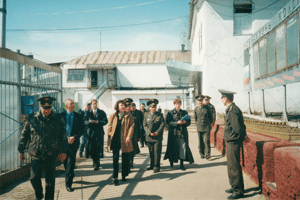The broad development of a partnership programme between the Moscow pre-trial prisons (SIZOs) and the United Kingdom prison services started to take shape in the summer of 1999.
The first formal discussions between the Department for International Development (DfID) and the International Centre for Prison Studies (ICPS) took place in the autumn of that year and agreement was reached in principle for a three year project which would involve professional partnerships between the Moscow SIZOs and staff training institute an equivalent number of prison service establishments in the United Kingdom. The primary goal for the project, which became known as the Prison Partnership Project (PPP), was the “better observance of prisoners’ human rights in Russian SIZOs”. It was hoped that the terrible physical conditions which existed in the Moscow SIZOs would be made decent and that relationships between staff and prisoners would be improved. To the extent that this happened, it was planned that the lessons learned in Moscow would be disseminated throughout Russia.
The staff training institute and the SIZOs in Moscow City were pre-determined as the Russian partners. The Prison Services of England and Wales and of Northern Ireland agreed to select partners on the basis of the nearest match to the individual Russian institutions. HM Prisons Durham, Liverpool, Manchester and Styal and the Training College in Wakefield volunteered as the English partners, while HM Prison Magilligan and HM Young Offenders Institution Hydebank, were the partners from Northern Ireland.
In the early part of the project action plans were drawn up between each set of partners. Partners carried out reciprocal visits on an annual basis over a three year period. In autumn each year a seminar for all partners took place in Moscow to examine progress on the action plans and to consider the place of human rights in prisons.
While much remains to be done, it was possible to identify specific improvements which had taken place by the time the project ended in December 2003. These included:
· Major renovation of the physical structure
• Removal of shutters from windows, thus allowing prisoners access to light and fresh air
• Abolition of the internal body searches which were previously carried out on all newly admitted women prisoners
• Implementation of new staffing arrangements which have allowed personnel to work more closely with smaller groups of prisoners
• New training course for staff incorporating human rights principles
• New training course for staff trainers
• Improved personal relationships between prisoners and staff
• Increase in the level of daily activities for prisoners
Both the Russian and the British prison staff gained an increasing understanding of the importance of working within a human rights context and the way in which this could improve the prison environment.
As the Moscow project came to an end the Russian government indicated that it would like the lessons which had been learned to be disseminated throughout the seven federal districts of the country. The UK Foreign Office and the Ford Foundation agreed to fund this new project and over a period of 18 months the Russian and UK partners would be carrying out this work.
